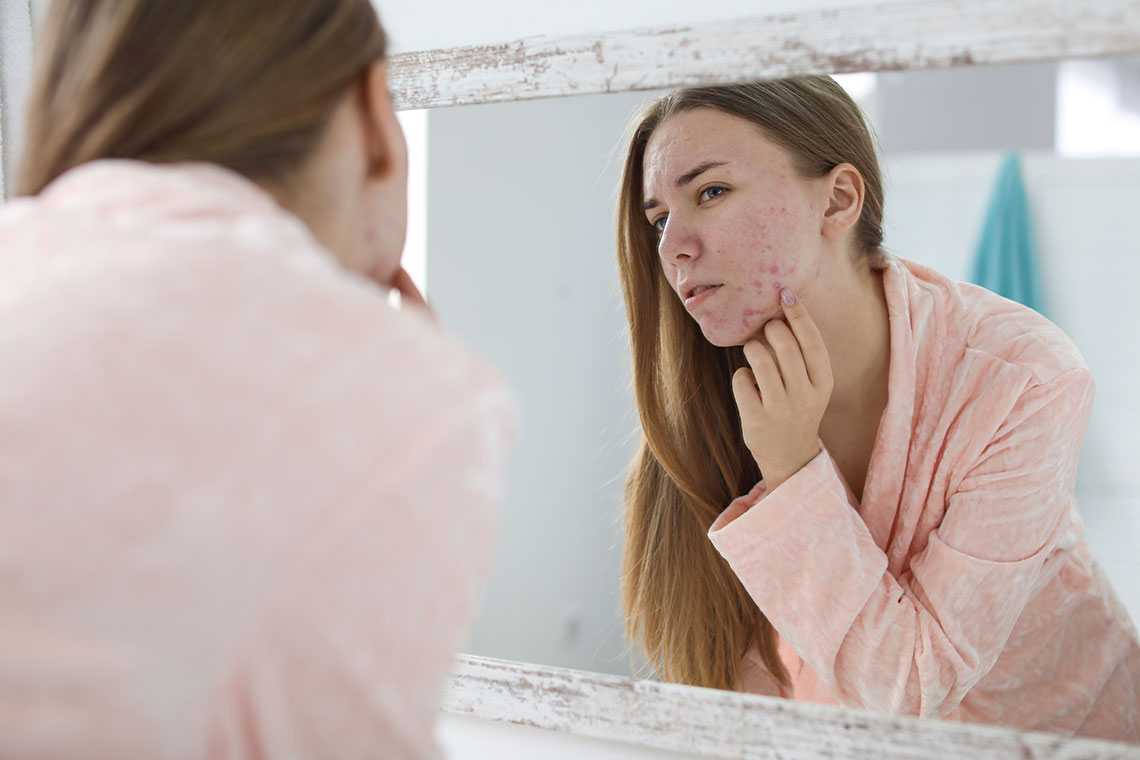Do you have acne? Properly caring for your skin is an important part of fighting this skin condition. Here are some tips to help you effectively treat acne-prone skin.

WHAT CAUSES ACNE?
It can be difficult to pinpoint exactly what causes acne. Puberty, genetics, and hormones (including stress hormones) are sometimes to blame, as are diet, smoking, exposure to sunlight, and even lack of sleep. The causes and symptoms can also differ depending on your age.
The skin and its natural microbiota play a key role in defending against external aggressors. In addition, the sebaceous glands hidden at the roots of your hair produce a greasy substance called sebum, an essential protective film that keeps the skin hydrated. Sometimes, these glands produce too much sebum, and the pores that secrete it can become clogged with dead skin cells. Blocked pores promote the growth of bacteria, leading to inflammation and the appearance of acne on the face and neck. Acne can also occur on the shoulders, back, and arms.
It’s important to take good care of your skin to keep it healthy, especially if you experience issues such as acne where proper care contributes to treatment.
HOW TO CARE FOR ACNE-PRONE SKIN
People with acne can get several types of pimples, ranging from small blackheads to very painful cysts. No matter what type of acne you have or its level of severity, proper skin care is essential.
Here are the steps you should incorporate into your daily routine.
1
Cleansing
It’s recommended to gently wash your skin twice a day, morning and evening, with a mild cleanser. At the pharmacy, you can find oil-free, non-comedogenic (non-clogging) cleansers made with different acids (salicylic, glycolic, alpha hydroxy, and lipohydroxy acid) or benzoyl peroxide. These products are specially designed to fight acne.
Be sure to rinse your face thoroughly, ideally with warm water, to avoid leaving any residue on your skin that could clog your pores. Daily cleansing limits the growth of bacteria and removes the dead skin and excess oil that can block your pores and cause pimples. It’s best not to repeat this step more than twice a day, as doing so could actually irritate your skin and make acne worse.
You should also always shower after exercising. Sweat and oil increase the accumulation of bacteria on your skin, which can lead to the formation of new acne lesions.
2
Moisturizing
Moisturizing your skin is even more important when you have acne. Your skin reacts to dryness by producing more sebum, which can potentially cause more pimples. Choose a moisturizer made for your skin type that is oil-free, non-comedogenic, and ideally formulated with sun protection.
3
Sun protection
Exposure to sunlight thickens the skin; this makes it harder for sebum to drain and can promote acne. That’s why it’s important to protect your skin when you’re out in the sun. In addition, many acne products make the skin more sensitive to sunlight, so it’s a good idea to use sunscreen with an SPF of at least 30.
4
Makeup
You can still wear makeup if you have acne-prone skin. However, you should be careful about what products you choose and follow these recommendations:
- Choose water-based products that are not oily or greasy.
- Look for labels that say “non-comedogenic,” which indicates that the product won’t clog your pores.
- Throw away expired products and clean your makeup brushes regularly to avoid contaminating your skin with bacteria likely to cause irritation or worsen your acne.
- Remove makeup every night before going to bed.
MORE ACNE-FIGHTING TIPS
In addition to this daily skincare routine, try these tips to help better control your acne:
- Avoid touching your pimples to prevent scarring.
- Don’t scrub your skin to reduce irritation.
- Wash your pillowcase and bed sheets regularly.
- Wear loose clothing to avoid rubbing and sweat accumulation.
- Shave infrequently and use a razor that does not irritate the skin.
- Avoid after-shave products that contain alcohol.
- Wash your hair often if it tends to be oily.
Acne treatment isn’t limited to medication. It starts with how you take care of your skin on a daily basis. For more information on skin care, speak to a cosmetic expert or pharmacist at your local Brunet store. They are there to advise you on how to maintain healthy skin.
Last updated on August 3, 2022
CHECK OUT THESE ARTICLES FOR MORE SKINCARE TIPS
The best sunscreen for your skin type